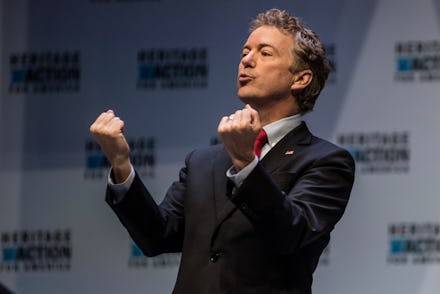Rand Paul's Biggest Supporters Are Questioning His Libertarianism — And His Future

There's trouble in Rand Land.
When Kentucky Sen. Rand Paul announced his campaign for the presidency in April, he did so with an enthusiastic young voter base, a well-hyped campaign infrastructure and a relatively high standing in early polls. But after five months, "the most interesting man in politics" has garnered, well, very little interest.
Now, even the super PACs supporting his cash-strapped campaign are starting to wonder how long they can stand with Rand.
In an interview with Politico on Tuesday, Ed Crane, the head of PurplePAC, one of three major super PACs supporting Paul's presidential campaign, accused Paul of abandoning his libertarian views in search of wider support. "I have stopped raising money for him until I see the campaign correct its problems," Crane told Politico. "I wasn't going to raise money to spend on a futile crusade."
Crane, a co-founder of the libertarian Cato Institute, said that the small-government views (along with Paul's father's political prominence) which had vaulted Paul into the national spotlight had "disappeared" in an ill-considered quest for political viability. "I want to grab Rand by the lapels and say, 'What are you doing?'" Crane said in the interview. "I'm a big fan of Rand Paul. But whatever motivates his campaign, I don't get it."
Politico also reported that Crane's group had ceased fundraising, which Crane denied to the Washington Post on Tuesday. But he did not refute the original assertion that Paul's purported abandonment of libertarian principles had alienated him from the movement conservatives who helped make him a star.
"This is supposed to be the year of the outsider," Crane told the Washington Post. "He's the consummate outsider candidate, and he was perceived as yet another one of the guys."
Paul's predicament: It's a classic case of purity versus electability. After watching his father, Texas Rep. Ron Paul, be relegated to the sidelines of the 2012 campaign for the Republican nomination due to his dyed-in-the-wool libertarianism, the younger Paul decided to wiggle a bit on ideological purity in exchange for potential electability.
Gone are his father's talking points of putting an end to the Federal Reserve and the fierce anti-interventionist streak that hawkish Republicans see as a weakness. Paul even distanced himself from the libertarian label itself, opting instead for "libertarian-ish." His putative supporters aren't buying it, and see Paul's hesitance to quote Friedrich Hayek and Ayn Rand during stump speeches as ideological weakness.
(Somehow, this isn't the worst thing that's happened to a Paul-adjacent super PAC: Last month, longtime Paul aide and in-law Jesse Benton, head of the America's Liberty super PAC, was indicted by the Department of Justice on several charges of conspiracy and false statements. Benton is alleged to have funneled $73,000 to an Iowa state senator in exchange for an endorsement for Paul's father in his 2012 bid for the White House.)
Bad news for a campaign already in trouble: Once seen as a sincere ideological outsider in a field of overly pragmatic mainstream Republicans, Paul has seen his (now watered-down) message of small-government conservatism and individual freedom drowned out amid the national fixation on the ultimate outsider, billionaire front-runner Donald Trump, who is predicting Paul's imminent demise:
"I'm guessing Rand Paul is in a tough spot," top Republican strategist Rick Wilson told Mic last week. "Strong dissonance with the base over foreign policy, doesn't have that 'big room' presence in an environment where Trump is eating up all the scenery and no real sweet spot in the current chemistry of the GOP. It's a mess, and I don't think he or his people see a solid pathway."
Although Wilson said that Paul's hard stances on issues that appeal to libertarian-minded young voters are an important addition to the field, his dearth of Trump-esque magnetism may be Paul's undoing.
"It's kind of a shame, because Rand is a valuable voice on criminal justice reform, marijuana decriminalization and outreach," he said, "but I think he's the next to fall."
With his message muted and after two middling performances at the first Republican presidential primary debates, Paul has seen his national standing collapse into near-irrelevance. In New Hampshire (state motto: "Live Free or Die"), whose primary is seen as a do-or-die proposition by Paul's supporters, the Kentucky senator has dropped from being tied for first place to a humiliating eighth place.
Paul is even having trouble winning over support in his home state. On Wednesday, Matt Bevin, the Republican nominee for Kentucky's upcoming gubernatorial election endorsed Dr. Ben Carson over Paul, saying that the current runner-up in the polls has "the best chance of uniting all the pieces." (Bevin did say that Paul, who will be stumping for him at a rally this weekend, has "been very gracious to me," which is rather sporting of him.)
Politicos say that Paul would sooner sell his own shoes than drop out before the New Hampshire primary. ("His personality is such that there's no way he's out until after New Hampshire," Crane told the Washington Post.) But if the current turmoil escalates and his anemic fundraising continues, Paul could find himself barefoot sooner rather than later.